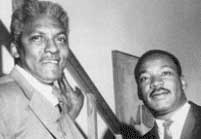-
- Law schools file lawsuits over military recruitment
- Senator wants Ten Commandments monument at Capitol
- Mass. seeks high court opinion
- Ohio House votes not to recognize gay marriage
- Diocese tells priest to stop distributing pamphlets
- Same-sex divorce fuels legal challenge
- Republican legislator to introduce anti-gay bill
- Ruling favors HIV-positive man
- National News Briefs
- World News Briefs
san diego
Bayard Rustin film screening, Dec. 19
Gay civil rights activist emphasized reaching across identity lines
Published Thursday, 18-Dec-2003 in issue 834
The Malcolm X Library and Performing Arts Center is hosting a special screening of the film Brother Outsider: The Life & Times of Bayard Rustin, chronicling the life of the African American openly gay civil rights activist’s 60-year career as a radical political human rights activist, on Friday, Dec. 19, at 7:00 p.m. Originally scheduled for October, but cancelled due to the San Diego wildfires, the film will be followed by a discussion facilitated by Dr. Pat Washington, a Women’s Studies professor, activist and scholar.
Bayard Rustin is best remembered as the organizer of the 1963 Civil Rights March on Washington, the largest nonviolent protest ever held in the United States at that time, and for introducing Gandhi’s nonviolent protest techniques to Martin Luther King, Jr. Rustin was an openly gay black man during a time when homophobia was rampant throughout society and within the civil rights movement. According to excerpts from FBI files included in the film, J. Edgar Hoover thought of Rustin as a “suspected communist and known homosexual subversive.”
“Rustin is not more prominent because of the double whammy of homophobia and anti-communism,” said Marc Chery, branch manager at Malcolm X Library & Performing Arts Center. “As a radical (before his later life), he wouldn’t be acknowledged fully anyway; and mainstream American historiography generally suffers from the great man/great leader bias which blinds it to the indispensable work of behind-the scene organizers like Rustin and Ella Baker and countless other organizers for social change.”
Through archival material, government propaganda films, anecdotes and interviews, Brother Outsider covers Rustin’s days as a communist and radical pacifist, his assistance with the Montgomery Bus Boycott, and his role as an international human rights activist and political liaison later in life.
As a pacifist, Rustin refused to register for the draft, serving three years in prison to protest the war. A year after his release, he helped plan the first freedom ride in the South, challenging the Jim Crow laws of segregation. In North Carolina, he was arrested for his participation in the freedom ride and served 22 days on a chain gang. His published accounts of that experience prompted an investigation into chain gangs that led to them being outlawed in the state. Shortly afterwards, Rustin also helped secure President Truman’s order to eliminate military segregation.
Rustin protested human rights violations worldwide as well, traveling to India, where he studied the teachings of Gandhi, and Africa, where he was frequently arrested for protesting Britain’s colonial rule. He was at one time vice chairman of the International Rescue Committee; his efforts gained international attention for numerous refugee causes, including the plights of Vietnamese “boat people” in Southeast Asia a 1982 emergency coalition for Haitian Refugees.
“We only focus on our groups, and do not realize that the rights of other groups — such as immigrants — impact our quality of life as well,” said Washington. “We’re missing something, a key way in which we can join together for political change.… Someone had mentioned that Bayard Rustin is an unsung hero of the black freedom movement, of the LGBT movement. He is an unsung hero of our need to really reach deep into ourselves to bridge those boundaries so that we are working for positive social change for all of our communities.”
Late in life, Rustin gave numerous interviews discussing the effects anti-gay prejudice had on his human rights activism, addressing GLBT groups and speaking on behalf of gay rights legislation.
“[T]he threat of publicizing or going on a negative media campaign about him being a gay man was enough to, on Bayard’s part, make him step back for the good of the movement, on Martin Luther King, Jr.’s part, convince him to put Bayard in a less prominent role for the good of the movement,” Washington continued. “And yet here you have an openly gay man; there are a lot of interesting pieces… it was not just the black civil rights movement. He was involved in other movements and he was embarrassed the impact his being caught in compromising positions would have on the organizations he loved and held dear to his heart.”
The Center is co-sponsoring Friday’s film screening. “The Center is always eager to support events and entertainment that help to educate all of us about the trailblazing efforts and struggles of those who have given our community a lifetime of energy and effort” said Delores Jacobs, executive director of The Center. “It’s particularly important to us to support efforts to educate us all about the unsung heroes from the under-recognized communities of color and we are proud to support this film and discussion.”
Seema Sueko of Mo’olelo Performing Arts Company, a new Asian repertory theater in San Diego, will be participating in the event as well. Sueko will present some background on Rustin, and explore the ways in which his politics revolved around the notion of coalition building and working across identity lines to promote social change.
The Malcolm X Library and Performing Arts Center is located at 5148 Market St. For more information about the film screening, call (619) 527-3405.
|
|
Copyright © 2003-2025 Uptown Publications


